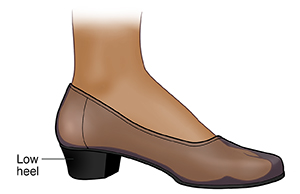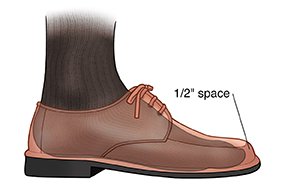A
B
C
D
E
F
G
H
I
J
K
L
M
N
O
P
Q
R
S
T
U
V
W
X
Y
Z
Click a letter to see a list of conditions beginning with that letter.
Click 'Topic Index' to return to the index for the current topic.
Click 'Library Index' to return to the listing of all topics.
Treating Bunions
Although a bunion won’t go away, wearing shoes that fit correctly will often relieve the pain. Padding and icing the bunion may also help. Bunions that remain painful may need surgery.
Shoes
To relieve a bunion, you don’t have to buy shoes that are out of fashion. But follow these tips:
-
Shop for shoes late in the day. This is when your feet are the largest.
-
Have both feet measured. Fit shoes to your larger foot.
-
Look for shoes that have the same shape as your foot but are slightly wider across the toes.
-
Choose low-heeled shoes.
-
Always try shoes on. Stand up and walk around. If the shoes aren’t comfortable, don’t buy them.
 |
| Heel height should be low. The back of the shoe should grip your heel firmly so the shoe doesn't flop when you walk. |
 |
| There should be 1/2" between your longest toe and the tip of the shoe. The shoe should be wide enough for you to wiggle your toes. |
Ice massage
To help relieve a painful bunion, put an ice cube in a plastic bag. Rub the ice on the bunion for 5 minutes. Repeat 2 to 3 times a day.
Pads
You may want to put a bunion shield type pad over the bunion to cushion it. You can buy bunion pads at most drugstores. In addition, toe spacers or other inserts can be used in your shoe to help decrease the pain of bunions.
Surgery
Wearing wider shoes and padding the bunion may not relieve the pain. Your healthcare provider may then suggest surgery. During surgery, the bunion is shaved away and the bones are put back in a straight line.
Online Medical Reviewer:
Michelle Anderson DNP
Online Medical Reviewer:
Mike Murphy
Date Last Reviewed:
9/1/2025
© 2000-2025 The StayWell Company, LLC. All rights reserved. This information is not intended as a substitute for professional medical care. Always follow your healthcare professional's instructions.